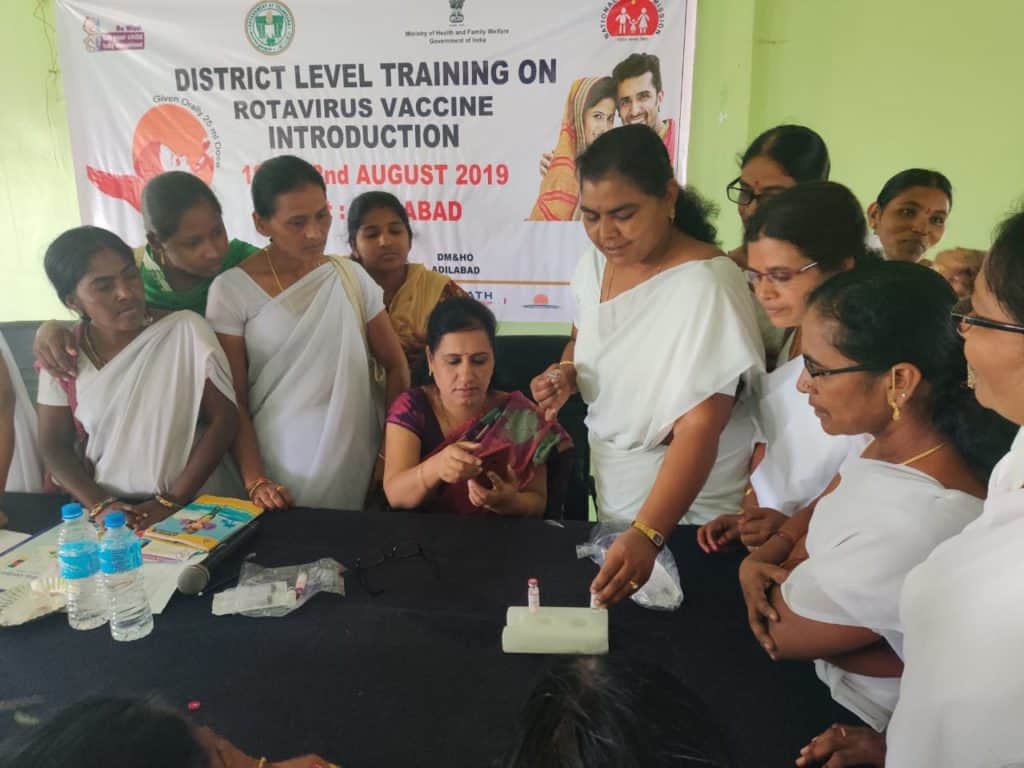Partnering to Reduce Rotavirus through Nationwide Vaccine Introduction
November 22nd, 2019 | viewpoint
Through years of leadership, commitment, planning, and partnership, India has introduced rotavirus vaccine (RVV) in all of its 36 states and union territories. The three doses of RVV provided to the entire birth cohort of 26 million children every year will save countless lives and be a model to other countries working to introduce RVV into their routine immunization programs. John Snow Inc. (JSI), WHO, UNICEF, United Nations Development Programme, Global Health Strategies, the Bill & Melinda Gates Foundation, and the Immunization Technical Support Unit contributed to the success of this tremendous public health effort in India.
Diarrheal disease is the leading cause of death in children under the age of five, and rotavirus is the most common cause of severe diarrhea in low- and middle-income countries. Despite the availability of safe, effective vaccines, rotavirus kills about 200,000 children globally and hospitalizes hundreds of thousands more each year.
In 2016, India became the first country in Asia to launch the RVV through a phased rollout as part of its Universal Immunization Program. Four states introduced the vaccine in Phase 1 (2016); five in Phase 2 (2017); and two in Phase 3 (2018). In June 2019, the Ministry of Health & Family Welfare (MOHFW) announced its intent to complete a nationwide rollout of RVV as part of the newly elected government’s first-100-days agenda. Between June 2019 and September 2019, as the remaining 25 states and seven union territories introduced the vaccine, the MOHFW and its partners achieved this goal.
As the lead partner in RVV introduction in the country, JSI provided technical support in collaboration with other partners to national and state governments. This included but was not limited to support for the development of operational guidelines and training materials, capacity building of medical officers and health workers, cold chain assessment, vaccine logistics management, adverse events following immunization preparedness, coverage monitoring, and post-introduction evaluation.

India’s rapid nationwide RVV introduction was a result of the government’s strong political commitment, MOHFW and state leadership, and collaboration among partners. Planning for the introduction included preparedness assessments, cascade training to build the capacity of health staff at all levels, ensuring supply of vaccine at all cold chain points, social mobilization and communication, and wholehearted participation of front-line health workers. This strategy–and its success–has made India a model in the Asia region for the rapid expansion of a new vaccine.
“Diarrhea is common and known among the community; and everyone wants to protect children from diarrhea. This made it easy to communicate the message for this new vaccine. Because of rotavirus vaccine introduction, there has been a significant increase in demand for other vaccines.” —Rekha Khatik, ANM, Rajasthan.
Written by Saumendra Bagchi and Arup Roy
We strive to build lasting relationships to produce better health outcomes for all.